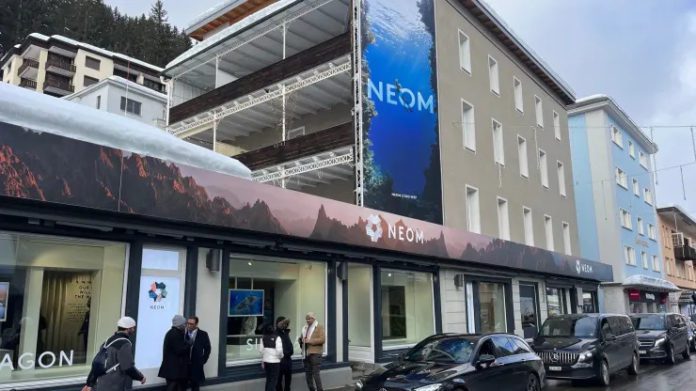Saudi Arabia is making a bold push to position itself as the leading AI tech hub in the Middle East, challenging the long-standing dominance of the United Arab Emirates (UAE). The Saudi delegation at the World Economic Forum showcased several ambitious projects, including Neom, a new urban development, and the AlUla initiative, part of the kingdom’s plan to make the heritage city a global tourist destination.
The high-profile presence on the Davos Promenade reflects Saudi Arabia’s commitment to economic diversification outlined in its Vision 2030 strategy. The Neom project, a focal point of the exhibition, aims not only to attract tourists and residents but also to showcase innovation and openness for business. According to a Neom spokesperson, the goal is to educate the investment community about the development’s potential.
Saudi Finance Minister Mohammed al-Jadaan highlighted the country’s economic transformation, noting a significant decrease in oil’s contribution to GDP from 70% to the range of 30% to 35%. Al-Jadaan emphasized diversification into sectors like tourism, technology, and logistics.
Vision 2030 encompasses various “giga” projects, signaling Crown Prince Mohammed bin Salman’s commitment to modernization. These projects range from massive infrastructure investments to initiatives aimed at attracting fintech talent from the region and beyond.
Political risk consultant Ian Bremmer praised MBS’s efforts in driving entrepreneurship, diversifying the economy, and combating corruption. The Kingdom’s economy recently surpassed the $1 trillion threshold, surpassing the UAE’s $500 billion economy.
While the UAE has long been a tech hub in the region, Saudi Arabia is aggressively investing in its tech ambitions. Experts suggest that the core mission is to attract talent for AI development. The King Abdullah University of Science and Technology (KAUST) is a key player, aligned with Saudi Arabia’s goal to be a global AI leader by 2030. KAUST focuses on strategic partnerships, startups, and AI-powered government services.
Experts at Davos believe that Saudi Arabia’s key differentiator lies in its abundant resources, regulatory flexibility, and a young, educated population eager for innovation. Observers draw parallels between Saudi Arabia’s aspirations and the success stories of Singapore and Israel, emphasizing the importance of nurturing smart people to drive technology and innovation.
As Saudi Arabia aims to bridge the gap with the UAE and emerge as the Middle East’s AI tech hub, the Davos debut serves as a strategic move to attract global attention and talent to fuel its ambitious Vision 2030 plan.




